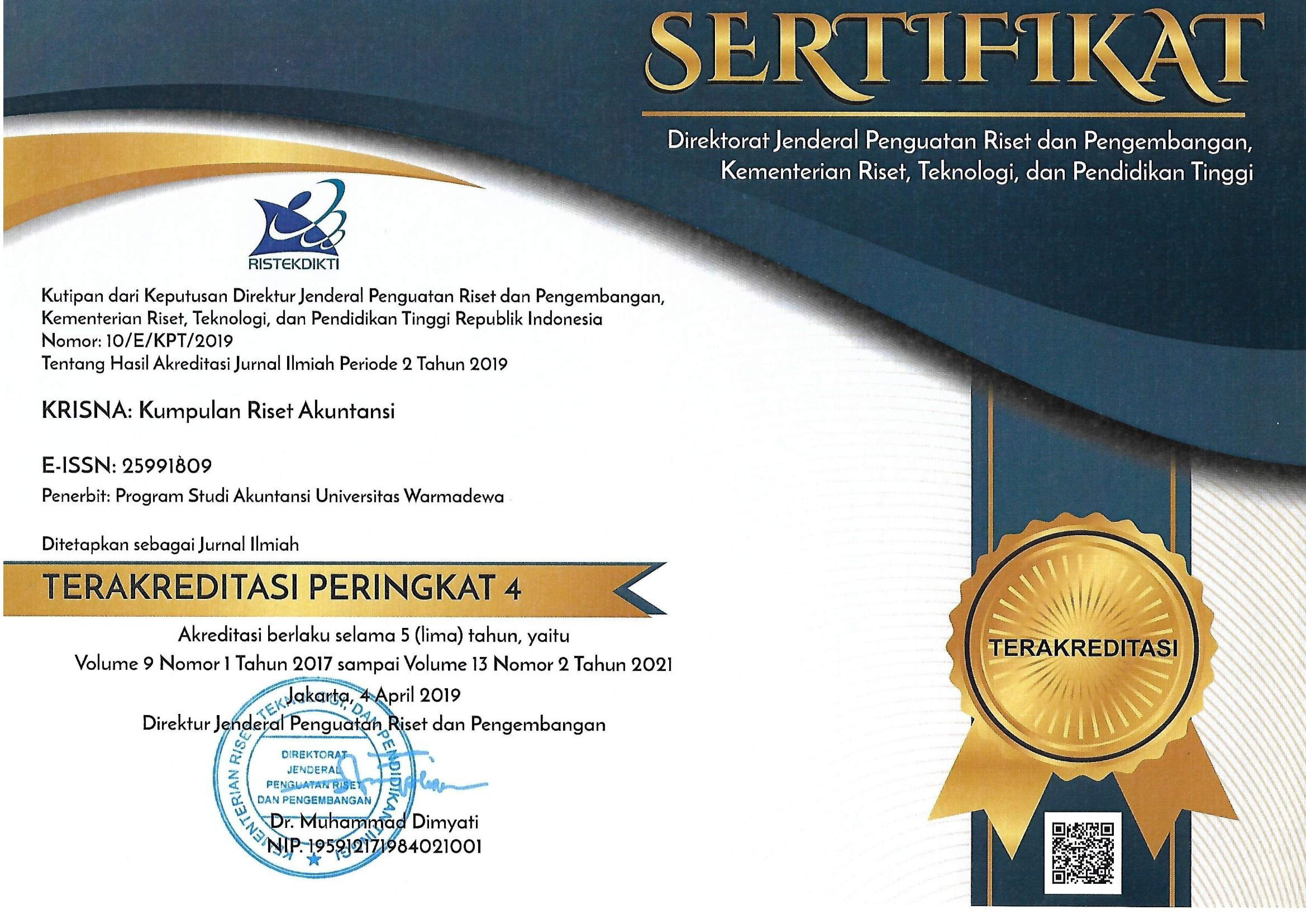PENGARUH INSENTIF KEUANGAN, KOMITMEN KARYAWAN, SELF EFFICACY, DAN SELF ESTEEM TERHADAP KINERJA DALAM KONDISI FAIRNESS
Abstract
Tujuan penelitian ini adalah untuk menguji pengaruh insentif keuangan, komitmen karyawan, self efficacy dan self esteem terhadap kinerja karyawan dalam kondisi munculnya rasa ketidakadilan dan membuktikan secara empiris bahwa motivasi intrinsik memberikan pengaruh lebih besar terhadap kinerja dibandingkan motivasi ekstrinsik dalam kondisi munculnya ketidakadilan. Penelitian ini menggunakan mahasiswa Akuntansi sebagai subyek penelitian dan sampel akhir penelitian yang sesuai dengan tujuan penelitian sebanyak 39 sampel. Alat analisis yang digunakan yaitu analisis regresi berganda dengan bantuan SPSS. Hasil penelitian menunjukkan insentif keuangan berpengaruh secara signifikan terhadap kinerja meskipun muncul rasa ketidakadilan. Hal ini menunjukkan insentif keuangan masih merupakan motivasi kuat bagi seseorang untuk meningkatkan kinerja. Komitmen karyawan, self efficacy dan self esteem tidak berpengaruh secara signifikan terhadap kinerja dalam kondisi munculnya rasa ketidakadilan. Variabel komitmen karyawan dan self efficacy memiliki arah pengaruh negatif yang artinya karyawan berkomitmen tinggi dan memiliki self efficacy tinggi jika memiliki persepsi ketidakadilan terhadap insentif keuangan yang diberikan sebagai reward atas kinerja maka kinerja mereka akan turun. Insentif keuangan lebih besar pengaruhnya terhadap kinerja dibandingkan komitmen karyawan, self efficacy dan self esteem dalam kondisi munculnya persepsi ketidakadilan.
References
Adam, J. S. (1965). Inequity in social exchanges. In Advances in Experimental Social Psychology.
Akgunduz, Y. (2015). The influence of self-esteem and role stress on job performance in hotel businesses. International Journal of Contemporary Hospitality Management. https://doi.org/10.1108/IJCHM-09-2013-0421
Akter, N. (2016). Employee Training and Employee Development Is the Predictors of Employee Performance; A Study on Garments Manufacturing Sector In Bangladesh. IOSR Journal of Business and Management.
Conger, J. A., & Kanungo, R. N. (1994). Charismatic leadership in organizations: Perceived behavioral attributes and their measurement. Journal of Organizational Behavior. https://doi.org/10.1002/job.4030150508
Details, A., & Abdalla Moh, D. (2018). Impact of Financial Incentives on Performance of Employees in Jordanian Commercial Banks and its Reflections on Jordanian Economy: A Field Study. In International Journal of Management Sciences and Business Research.
Dinku, G. T. (2018). Effects of employees commitment on organizational performance at Arjo Didessa Sugar Factory. African Journal of Business Management. https://doi.org/10.5897/ajbm2017.8395
Etti Ernita Sembiring. (2019). Pengaruh Insentif Keuangan Terhadap Kinerja Dengan Keadilan Distributif Sebagai Variabel Pemoderasi: Suatu Eksperimen. Jurnal Akuntansi Keuangan Dan Bisnis, Vol.12 No., 87–94.
Ghozali, I. (2011). Aplikasi Analisis Multivariate Dengan Program IBM SPSS 19 (edisi kelima). In Aplikasi Analisis Multivariate dengan program SPSS.
Hameed, M. A., Ramzan, M., Kashif Zubair, H., Ali, G., & Arslan, M. (2014). Impact of Compensation on Employee Performance (Empirical Evidence from Banking Sector of Pakistan). International Journal of Business and Social Science.
Jean, K. N., Ngui, T. K., & Robert, A. (2017). Effect of Compensation Strategies on Employee Performance: A Case Study of Mombasa Cement Limited. International Journal of Innovative Social Sciences & Humanities Research.
Krishnan, R., Loon, K. W., Ahmad, N. A. F. binti, & Yunus, N. A. S. (2018). Examining the Relationship between Organizational Justice and Job Performance. International Journal of Academic Research in Business and Social Sciences. https://doi.org/10.6007/ijarbss/v8-i3/3942
Mabaso, C. M., & Dlamini, B. I. (2017). Impact of Compensation and Benefits on Job Satisfaction. Research Journal of Business Management. https://doi.org/10.3923/rjbm.2017.80.90
Machmud, S. (2018). The Influence of Self-Efficacy on Satisfaction and Work-Related Performance. INTERNATIONAL JOURNAL OF MANAGEMENT SCIENCE AND BUSINESS ADMINISTRATION. https://doi.org/10.18775/ijmsba.1849-5664-5419.2014.44.1005
Meliana, V. (2017). EFEKTIVITAS PEMBERIAN KOMPENSASI FINANSIAL PERUSAHAAN. Jurnal Riset Manajemen Dan Bisnis (JRMB) Fakultas Ekonomi UNIAT. https://doi.org/10.36226/jrmb.v2i3.67
Mundhra, D. Das, & Jacob, W. (2011). Intrinsic Motivators in the Indian Manufacturing Sector : An Empirical Study. The IUP Journal of Organizational Behavior.
Njoroge, S. W., Kwasira, J., Wambui Njoroge, S., & Kwasira, J. (2015). Influence of Compensation and Reward on Performance of Employees at Nakuru County Government. IOSR Journal of Business and ManagementVer. I. https://doi.org/https://doi.org/10.9790/487X-171118793
Princy, K., & Rebeka, E. (2019). Employee commitment on organizational performance. International Journal of Recent Technology and Engineering. https://doi.org/10.35940/ijrte.C4078.098319
Rahman, A., Shahzad, N., Mustafa, K., Khan, M. F., & Qurashi, F. (2016). Effects of organizational justice on organizational commitment. International Journal of Economics and Financial Issues.
Sleimi, M. T., & Davut, S. (2015). Intrinsic and Extrinsic Motivation: Pivotal Role in Bank Tellers Satisfaction and Performance: Case Study of Palestinian Local Banks. International Journal of Business and Social Science.
Snelgar, R., Shelton, S. A., & Giesser, A. (2017). A comparison of South African and German extrinsic and intrinsic motivation. South African Journal of Economic and Management Sciences. https://doi.org/10.4102/sajems.v20i1.1552
Sutanto E, M. (1999). The Relationship Between Employee Commitment and Job Performance. Jurnal Manajemen Dan Kewirausahaan, Vol.1 No.1(Vol.1 No.1 March 1999).
Taylor, F. W. (2017). The Principles of Scientific Management. In Modern Economic Classics-Evaluations Through Time. https://doi.org/https://doi.org/10.4324/9781315270548-22
Wickramasinghe, V., & Dabere, S. (2012). Effects of performance-based financial incentives on work performance: A study of technical-level employees in the private sector in Sri Lanka. Performance Improvement Quarterly. https://doi.org/10.1002/piq.21121
Zobal, C. (1999). The “ideal†team compensation system - an overview, part II. Team Performance Management: An International Journal. https://doi.org/10.1108/13527599910263125
 Abstract viewed = 487 times
Abstract viewed = 487 times
 PDF (Bahasa Indonesia) downloaded = 750 times
PDF (Bahasa Indonesia) downloaded = 750 times









